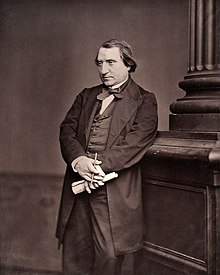
Back Ernest Renan AN إرنست رينان Arabic رينان ARZ Ernest Renan Azerbaijani Жазеф Эрнест Рэнан Byelorussian Ернест Ренан Bulgarian Ernest Renan Breton Ernest Renan Catalan Ernest Renan Czech Ernest Renan Welsh
Ernest Renan | |
|---|---|
 Ernest Renan circa 1870s | |
| Born | Joseph Ernest Renan 28 February 1823 Tréguier, Kingdom of France |
| Died | 2 October 1892 (aged 69) Paris, French Third Republic |
| Notable work | Life of Jesus (1863) What Is a Nation? (1882) |
| Era | 19th-century philosophy |
| Region | Western philosophy |
| School | Continental philosophy |
Main interests | History of religion, philosophy of religion, political philosophy |
Notable ideas | Civic nationalism[1] |
| Signature | |
Joseph Ernest Renan (French: [ʒozɛf ɛʁnɛst ʁənɑ̃]; 27 February 1823 – 2 October 1892)[2] was a French Orientalist and Semitic scholar, writing on Semitic languages and civilizations, historian of religion, philologist, philosopher, biblical scholar, and critic.[3] He wrote works on the origins of early Christianity,[3] and espoused popular political theories especially concerning nationalism, national identity, and the alleged superiority of White people over other human "races".[4] Renan is known as being among the first scholars to advance the disputed[5] Khazar theory, which held that Ashkenazi Jews were descendants of the Khazars,[6] Turkic peoples who had adopted the Jewish religion[7] and allegedly migrated to central and eastern Europe following the collapse of their khanate.[6]
- ^ Ernest Renan. "What is a Nation?", 1882; cf. Chaim Gans, The Limits of Nationalism, Cambridge University Press, 2003, p. 11.
- ^ . Popular Science Monthly. Vol. 42. December 1892. ISSN 0161-7370 – via Wikisource.
- ^ a b Römer, Thomas (11 October 2012). Homage to Ernest Renan: Renan's historical and critical exegesis of the Bible (Speech). Symposium. Amphithéâtre Marguerite de Navarre-Marcelin Berthelot: Collège de France. Retrieved 31 August 2020.
- ^ Cite error: The named reference
Cesaire1was invoked but never defined (see the help page). - ^ "Did the Khazars Convert to Judaism? New Research Says 'No'". en.huji.ac.il. Hebrew University of Jerusalem. 26 June 2014. Retrieved 31 August 2020.
- ^ a b Stampfer, Shaul (Summer 2013). "Did the Khazars Convert to Judaism?". Jewish Social Studies. 19 (3). Bloomington, Indiana: Indiana University Press: 1–72. doi:10.2979/jewisocistud.19.3.1. S2CID 161320785.
- ^ Feldman, Alex Mesibov (2023). "Chapter 4: Khazaria: The Exception Which Proves the Rules". In Raffensperger, Christian (ed.). How Medieval Europe was Ruled. Routledge. pp. 41–52. doi:10.4324/9781003213239-4. ISBN 978-1032100166.
© MMXXIII Rich X Search. We shall prevail. All rights reserved. Rich X Search